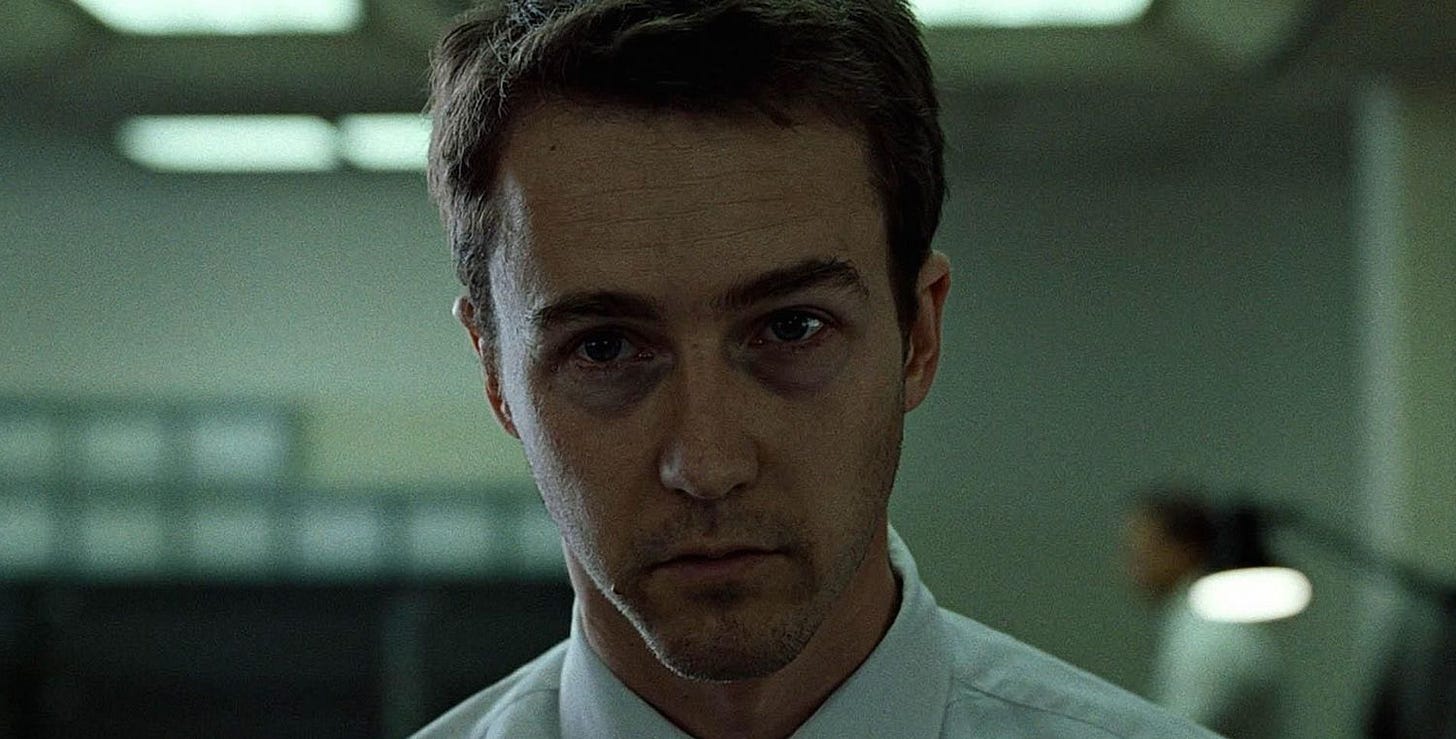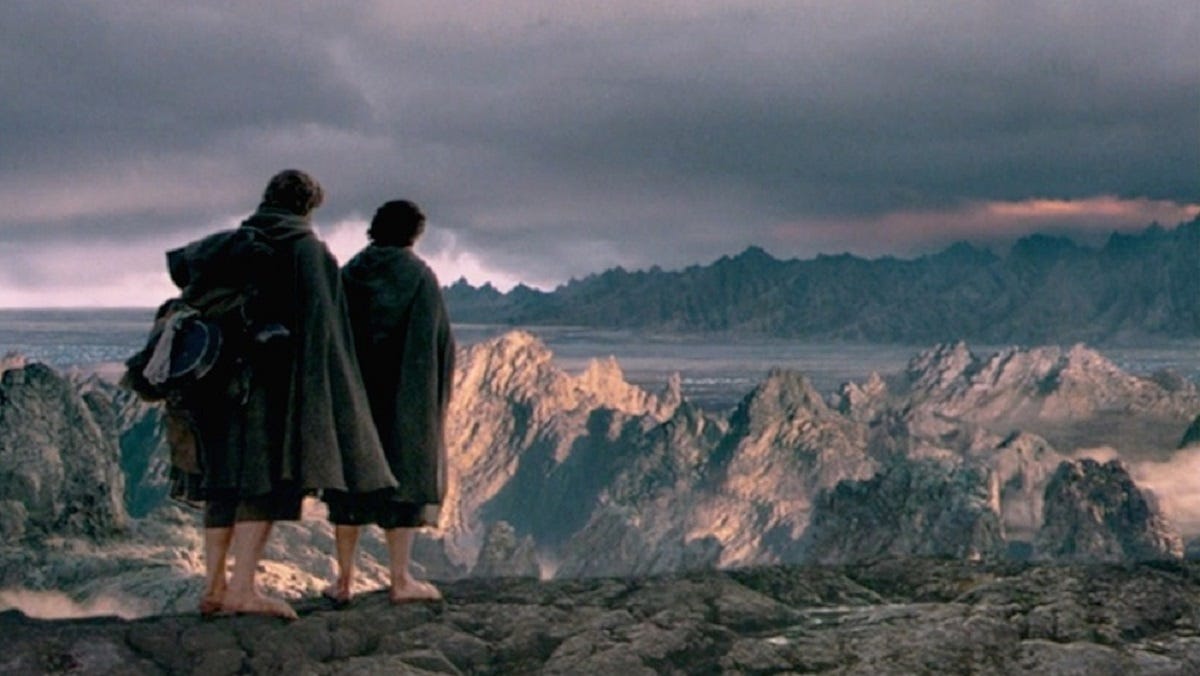In the cult classic film, Fight Club, the character Tyler Durden remarks that contemporary men are “the middle children of history” and lack some overriding existential goal that provides drive and meaning to their lives, noting that “We have no Great War. No Great Depression.” Many men, especially young men, are no strangers to this feeling of listlessness and excessive comfort. The result is millions stuck in a permanent state of NEETdom (not employed, not getting an education, not receiving training of any kind) and doing little more than sitting in front of a screen 40+ hours a week. They’re in total stasis.
If this mass of prime-age men (ages 25-54) were included in the unemployment rate, we would be looking at levels of unemployment similar to the Great Depression. Historically, having 7 million or more idle, able-bodied men would be setting off alarm bells and panic across society. This particular demographic can cause quite a bit of trouble in any society. Men need to be busy.
Indeed, in Fight Club, this very population is molded into a hyper-disciplined, fascistic paramilitary group that launches a nihilistic attack to destroy modern civilization.
It seems that the problem of listless men has been “solved,” at least for the time being, thanks to a potent cocktail of TV, video games, porn, weed, and painkillers. These are the forces keeping such men occupied and docile.
There are still very much alive debates over what caused this steady decline in male labor force participation, but one of the most obvious underestimated factors is that men are bombarded from a young age with the message that they are extraneous and no longer needed in today’s society. After all, “the future is female,” and how could that be remotely discouraging to men and boys?
Endless discussion in the culture about “toxic masculinity” from preschool onward has resulted in what some have characterized as a “boy crisis,” wherein boys are falling behind in education and development, and becoming more prone to suicide and existential crisis.
Ultimately, humans are existential beings, meaning that we must imbue our actions with some sort of meaning that gives them a higher purpose. This is evident in every aspect of our lives to such a degree that we often fail to recognize it. Humans could easily consume our required nutrients via some sort of Soylent Green-type mush with an IV, but we don’t.
Rather, ritualized dining, especially together with other humans, has been a mainstay of our social existence as far back in history as we can see. Such rituals grant the action of eating with meaning, rather than just utility. Similarly, it would be possible to shelter our bodies from the elements with some sort of formless burlap sack, but we don’t do that. Rather, one’s choice in clothing, even from a young age, carries significance to each individual.
Staring Into the Abyss
Beyond the meaning and symbolism that we create in even the most mundane parts of our lives, humans are ultimately forced to ask, “Who am I?” – in one context or another.
The answer to such pressing questions used to be more easily attainable thanks to the mediating institutions of society, especially family, community, church, labor, and one’s nation. Yet, with the decline of institutional bonds due to the state’s increasing role in civil society, people (especially men) find themselves asking in larger numbers what the purpose of their existence even is.
Descartes may have quipped, “I think, therefore I am,” but ultimately, as social persons we are only able to understand our existence in the context of our relation to others.
The solitary individual does not exist. A person only exists as a member of a family, a community, a workplace, a church, or a nation.
“He who is unable to live in society, or who has no need because he is sufficient for himself, must be either a beast or a god.” – Aristotle
We do not promote this idea in the slightest. And so we see collapsing institutions, especially plummeting marriage rates among young people. For as long as the institution of marriage has existed, it has served as a way of anchoring men down as providers to a woman and their children, and existential identity for that man becomes clear.
This is not true in every case, but exceptions do not negate the existence of rules of thumb.
One response to this crisis, best symbolized by Fight Club, is the open embrace of nihilism. If society rejects men as superfluous, then men will remind society what exists beneath the facade of civilization that has papered over the dark recesses of human nature and the violent chaos man is capable of when unrestrained.
Tyler Durden-like characters are all around us.
Indeed, one of the greatest potential dangers in the years to come is that those Durdens find one another before the bedraggled institutions of civil society do. What success for these unions looks like is anyone’s guess, but they need not be successful to cause vast, destabilizing destruction.
Just Keep Walking
Fortunately, this dark vision of the future is not the only option before us.
The collapse of the vital institutions of society provides the opportunity for meaning in and of itself. There may not be a “world war” to fight in, but it turns out that otherwise insignificant, everyday choices that men make are what will ultimately decide the course of the future.
Small choices and tiny acts of valor mean a great deal. They are not insignificant, not anymore.
Whether it is refraining from pilfering like there is no tomorrow from the self-checkout line, making sacrifices to support one’s family, or refusing to go on the government dole, these are the small choices that add up to keep civilization going.
Choosing to embrace the defense of a fragile civilization is likely to be a thankless task. In the words of Aragorn in The Lord of the Rings, now is the “time for valor without renown.”
Whereas the journeys of Aragorn, Legolas, and Gimli in Tolkien’s Middle Earth were characterized by constant battle with sword and shield, the marker of heroism for Hobbits like Frodo and Sam was primarily their willingness to keep walking.
Just keep walking…
There will not be any statues commemorating those who struggle as best they can to master the self-restraint necessary for civilized life to continue. Life itself is a monument to those who undertook this struggle already.
As the great Athenian leader Pericles stated in his famous funeral oration:
“The whole earth is the tomb of heroic men, and their story is not given only on stone over their clay, but abides everywhere, without visible symbol, woven into the stuff of other men's lives.”
There is no stone monument to every great-grandfather who died protecting his village from the cannibals one valley over, nor to his ancestor who hunted woolly mammoths and saber-toothed tigers to feed his family. Their monument is the fact that you are here, reading this very text and having the time and education required to do so.
World War III is a likely eventuality. Make no mistake, there are some men out there who wish it would go ahead and happen. They just want something to do.
It’s dark, I know. Putting that aside, we don’t get to decide the times in which we live or the existential crisis we’ll face.
The greatest choice men face today, right this very moment, is whether to embrace the daily struggle of life and civilization or whether to sink into the soft embrace of porn, weed, and video games. The latter is tempting, especially when no one will thank you for doing the right thing.
Ultimately, men need to embrace the continued existence of civilization as a worthy good in and of itself and be willing to stand as tributes for this cause. They must be willing to be unseen, unrecognized, and often unappreciated for the sacrifices that make human life possible for future generations.
There cannot be monuments built for all of us. The earth itself will have to do.
is a freelance writer and a Fall 2021 Marcellus Policy Fellow with the John Quincy Adams Society. He has been published in a variety of outlets including, The National Interest, the Washington Times, and The American Conservative. He is the co-host of the Mises Institute’s monthly foreign policy podcast, “War, Economy, and State,” and writes at his Substack, “The Yost Post.”










Very well said. Fight Club disturbed me greatly when it came out. It described the problem but offered no real solution. Thank you for helping to close the loop.
"Small choices and tiny acts of valor mean a great deal. They are not insignificant, not anymore."